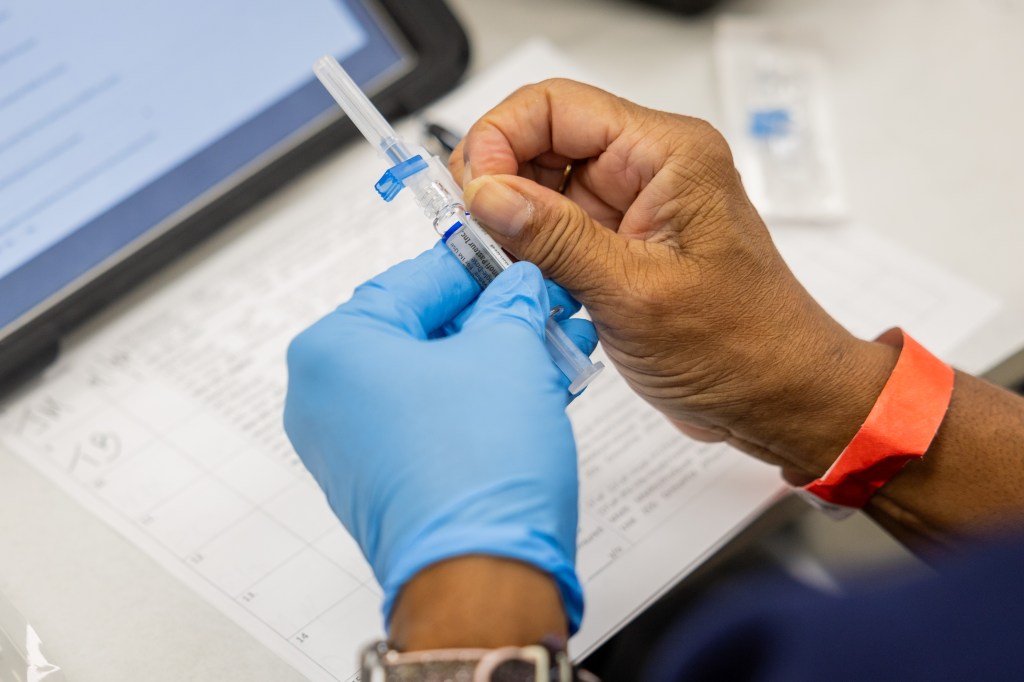Illinois is now experiencing high levels of respiratory illness, up from moderate levels the previous week, the state health department reported Tuesday.
The increase is not a surprise, given that this is the typical season for spikes in the flu, RSV and COVID-19, health officials and doctors say.
“The New Year has arrived, and Illinois is experiencing the expected winter surge in seasonal respiratory illnesses,” Dr. Sameer Vohra, director of the Illinois Department of Public Health, said in a news release.
Vaccines against the flu, COVID-19 and RSV, or respiratory syncytial virus, remain the most effective defenses against the illnesses, Vohra said. “It is not too late to get your vaccines, as the seasonal respiratory season can extend late into the spring,” he said.
The Illinois Department of Public Health has also previously recommended that health care facilities move to facility-wide masking amid increases in respiratory illness levels.
Statewide, 21% of emergency department visits were for acute respiratory illness for the week ending Dec. 28, up from 17% the previous week.
Test positivity for the flu is also way up in Illinois, to 23.8% for the week that ended Dec. 28, compared with 13.3% for the previous week. Test positivity for RSV rose slightly during that same time period, and positivity for COVID-19 declined slightly.
The previous year, however, was worse for emergency department visits for overall respiratory illnesses in Illinois compared with this year so far. For the week that ended Dec. 30, 2023, about 23.4% of emergency department visits were for respiratory illnesses.
Chicago is also seeing increases, particularly for the flu. In Chicago, the percentage of emergency department visits for the flu more than doubled for the week ending Dec. 28, surpassing the previous year’s peak, according to the Chicago Department of Public Health.
In Chicago, emergency department visits for COVID-19 were also up that week, while visits for RSV were relatively steady. Test positivity for the flu and COVID-19 were also up, while positivity for RSV fell slightly.
So far this season in Illinois, one child has died of COVID-19, two have died of the flu and one has died of RSV. RSV causes mild, coldlike symptoms in most people, but babies and older adults are more at-risk of developing severe cases.
Illinois is now one of 36 states with high or very high levels of respiratory illness activity, according to the Centers for Disease Control and Prevention.
In addition to the increase in respiratory virus activity, the nation has seen a dramatic rise in outbreaks of norovirus — an illness that can cause vomiting and diarrhea. There were 91 suspected or confirmed outbreaks across 14 states (not including Illinois) for the week ending Dec. 5, compared with a maximum of 41 outbreaks for that week in each of the previous three years, according to the CDC. A spokesperson with the Illinois Department of Public Health told the Tribune last week that initial analysis showed that norovirus cases in Illinois were slightly above the levels seen in the years right before the pandemic.
Health officials recommend thorough and frequent hand-washing, tight-fitting masks and good ventilation to help avoid catching the illnesses.
People with symptoms such as a fever, runny nose, sore throat or cough should consider getting tested early to help avoid spreading the illnesses and because treatments for the flu and COVID-19 are most effective when given early in an illness, Vohra said. Those who are ill should self-isolate or wear masks if they cannot isolate.
Annual vaccines are also available for the flu and COVID-19. An RSV vaccine is available for pregnant women, adults 75 and older and for those 60 to 74 who are at increased risk of severe RSV. Infants can receive an RSV antibody if their mothers didn’t get vaccinated during pregnancy.


